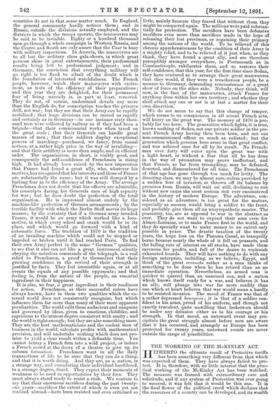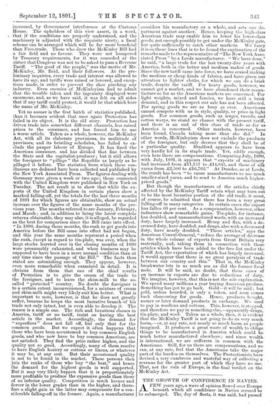THE WORKING OF THE McKINLEY ACT. H ITHERTO the ultimate result
of Protective tariffs has been something very different from that which was expected of them. They have always failed to pro- tect. It is, therefore, with no little interest that the prac- tical working of the McKinley Act has been watched. The measure was framed with extraordinary care and solicitude, and if any system of Protection was ever going to succeed, it was felt that it would be this one. It is the final flower of the political creed which declares that the resources of a country can be developed, and its wealth increased, by Government interference at the Customs House. The upholders of this view assert, in a word, that if the conditions are properly understood, and the machinery is adjusted with the requisite nicety, a fiscal scheme can be arranged which will be far more beneficial than Free-trade. Those who drew the McKinley Bill had a fair field and no favour. They were not hampered by Treasury requirements, for it was conceded at the outset that Congress was not to be asked to pass a Revenue Tariff. " The good of the people," was the motto of Mr. McKinley, Mr. Reid, and their followers. At the pre- liminary inquiries, every trade and interest was allowed to have its say, and tariffs were raised or lowered, and excep- tions made, in order to prevent the shoe pinching any industry. Even enemies of McKinleyism had to admit that the trouble taken and the ingenuity displayed were enormous, and, as we have said, it was felt on all sides that if any tariff could protect, it would be that which bore the name of Mr. McKinley.
Yet no sooner is the first batch of statistics published, than it becomes evident that once again Protection has failed in its object. It is the old story. Protection has driven trade into somewhat different channels, has raised prices to the consumer, and has forced him to use a worse article. Taken as a whole, however, the McKinley Act, with all its elaborate provisions, its multitude of provisoes, and its bristling schedules, has failed to ex- clude the pauper labour of Europe. It has fined the American consumer, and has divided that fine between the State and the capitalist-producer ; but it still allows the foreigner to " pillage " the Republic as largely as he pillaged it before.. The statistics from which these con- clusions are deduced have been collected and published by the New York Associated Press. The figures dealing with Germany were given a week or two ago ; those connected with the United Kingdom were published in New York on Tuesday. The net result is to show that while the ex- ports of the United Kingdom in certain places show a marked falling-off, yet the totals for the last three months of 1891 for which figures are obtainable, show an actual increase over the figures of the same months of the pre- vious year. The months referred to are January, February, and March ; and, in addition to being the latest complete returns obtainable, they may also, it is alleged, be regarded as the best for comparison since the Bill came into effect. " Da 1890, during those months, the rush to get goods into America before the Bill came into effect had not begun, and this year the same months represent a period when the rush, except in regard to tin-plate, was over, when the large stocks hurried over in the closing months of 1890 were presumably exhausted, and when business may be supposed to have been in a more normal condition than at . any time since the passage of the Bill." The facts thus stated are astonishing enough. They appear, however, even more remarkable when examined in detail. It is obvious from them that one of the chief results of Protection is to give the cream of the trade to the foreigner, and to leave the skim-milk to the so- called " protected " country. No doubt the foreigner is to a certain extent inconvenienced, for a mixture of cream and skim-milk might very likely suit him better. What is important to note, however, is that he does not greatly suffer, because he keeps the most lucrative branch of his trade not only intact, but is even able to develop it. The reason is a simple one. The rich and luxurious classes in America, tariff or no tariff, insist on having the best article in the market. Accordingly, the demand for " superfines " does not fall off, but only that for the common goods. But we expect it often happens that those who have been accustomed to buy common English goods, and who now have to buy common American, are not satisfied. They find the price rather higher, and the quality not so good. Accordingly, many of them resolve to have English hosiery or cottons or linens, or whatever it may be, at any cost. But their accustomed quality is not to be found in the market. These persons then join the ranks of those who buy " the best," and hence the demand for the highest goods is well supported. But it may very likely happen that it is proportionately more profitable to produce the expensive goods than those of an inferior quality. Competition is much keener and fiercer in the lower grades than in the higher, and there- fore a slight gain in the latter may compensate for a con- siderable falling-off in the former. Again, a manufacturer considers his manufactory as a whole, and sets one de- partment against another. Hence, keeping the high-class American trade may enable him to lower his lower-class goods, not enough possibly to get under the McKinley gate, but quite sufficiently to catch other markets. We fancy it is on these lines that is to be found the explanation of the remarks made to the representative of "The New York Asso- ciated Press " by a Leeds manufacturer. " We have done," he said, " a large trade for the last twenty-five years with America, both in the better and medium makes of goods. Since the new tariff came into force, we have ceased making the medium or cheap kinds of fabrics, and have given our attention to lighter cloths, for which we can do a brisk trade, despite the tariff. For heavy goods, however, we cannot get a market, and we have abandoned their manu- facture so far as the American markets are concerned. For light weights, mixed and fancies, we have still a brisk demand, and in this respect our sale has not been affected. For spring goods we are as busy as ever. Americans cannot compete with us in style, quality, or price in light goods. For common goods, such as serges, tweeds, and cotton warps, we stand no chance with the present tariff, and there is an end of this class of trade so .far as America is concerned. Other markets, however, have been found, Canada taking more than she did." In other words, McKinleyism does not exclude the products of the foreigner, but only decrees that they shall be of a particular quality. Bradford appears to have been very hardly hit in its staple trade. Yet, oddly enough, even here there are compensations. Comparing July, 1890, with July, 1891, it appears that " exports of machinery had increased from £11,157 to £14,845, and those of silk yarns from £2,506 to £16,763." At Dundee, as at Leeds, the result has been " to cause manufacturers to use much smaller-sized yarns, and to send to America much higher; priced goods."
But though the manufacturers of the articles chiefly affected by the McKinley Tariff retain what may turn out to be the most lucrative portion of the old trade, it must, of course, be admitted that there has been a very great falling-off in many categories. In certain cases the export has fallen 60 per cent. As a compensation, however, other industries show remarkable gains. Tin-plate, for instance, has doubled, and unmanufactured wools, with an increased duty, have largely increased. Hemp and flax, with a de- creased duty, have doubled, and drugs, also with a decreased duty, have nearly doubled. " These articles," says the American Consul-General, " reduce the average of decrease in the whole volume of exports from Great Britain very materially, and, taking them in connection with those articles which have been added to the free list under the Tariff Act, the exportation of which has largely increased, it would appear that there is no great paralysis of trade between our country and this." That is, the McKinley breakwater lets in as much sea as did the former fiscal mole. It will be said, no doubt, that these cases of an increase in exports are due to reductions of duty. We imagine, however, that this is not the sole explanation. We spend many millions a year buying American produce. Something has got to go back. Gold—it will be said ; but gold, unless hoarded, is only a token, and soon comes back clamouring for goods. Hence, products bought, sooner or later demand products in exchange. We used to pay in woollens and cottons. This, however, is stopped, and therefore we pay in something else,—apparently drugs, tin-plate, and wool. Taken as a whole, then, it is evident that the McKinley Tariff is not going to do us very much harm,—or, at any rate, not nearly so much harm as people imagined. It produces a great waste of wealth to oblige things to be manufactured in America which could be much better manufactured elsewhere ; and since wealth. is international, we are sufferers in common with the Americans. Still, for us there are compensations, and we can, at any rate, feel that the Americans take the major part of the burden on themselves. The Protectionists have devised a very cumbrous and wasteful way of collecting a revenue for the greater part of which they have no use. That, not the ruin of Europe, is the final verdict on the McKinley Act..



































 Previous page
Previous page